Exploring GLP-1 Drugs as Therapies for Brain and Biological Aging
Aging is the strongest risk factor for many chronic diseases, including frailty and neurodegenerative conditions. Geroscience research shows that these conditions share common biological mechanisms—often called the “hallmarks of aging”—that may be modified to improve health across the lifespan. Rather than targeting individual diseases, an emerging strategy is to repurpose existing medications that may act […]
Impact of social prescribing on quality of life and aging hallmarks
As people age, they become increasingly vulnerable to chronic diseases, functional decline, and conditions such as frailty that can significantly affect quality of life. Traditional health care systems tend to address these challenges one disease at a time. However, the geroscience framework offers a more powerful alternative: by targeting the underlying biological processes of aging […]
Impact of comprehensive geriatric assessment-informed care
Frailty is a common condition that affects many older adults in Canada, leading to a higher risk of falls, hospitalization, and loss of independence. As our population ages, understanding how to prevent or slow frailty has become increasingly important. Frailty develops when multiple body systems gradually lose resilience, and research shows this process is linked […]
Cultural perspectives of ageing
The Intercontinental Alliance for Integrated Care (IAIC) is a global initiative launched by Singapore University of Social Sciences (SUSS) to address healthcare challenges, particularly those related to aging populations and chronic diseases. In this project, the UBC IDEA Lab is collaborating with global researchers from Singapore, Thailand, China, Hong Kong, Britain, Brunei, and Canada to examine […]
Bidirectional associations between sleep and stress in everyday life
Inadequate sleep (such as poor sleep quality, short duration, and trouble falling asleep or staying asleep) can lead to greater risks for developing chronic conditions and for premature death. Inadequate sleep also influences daily experiences of stress, and vice versa. The UPLIFT Health Lab seeks to understand how sleep and stress are related. We are […]
Daily stress and cognitive performance
The Daily Stress and Cognition project examines the dynamics of stress and cognitive performance across the adult lifespan. We are particularly interested in whether health behaviours, such as physical activity, may buffer against the effects of stress on cognition. Utilizing daily surveys, physical activity and sleep measurements, and cognitive tasks, this study evaluates how daily experiences […]
Everyday discrimination, emotions, and health across adulthood
Everyday discrimination, such as being treated unfairly based on one’s age, is prevalent in daily life. People who experience everyday discrimination more frequently tend to have poorer mental and physical health, including biomarkers of accelerated aging, compared to those who are exposed to less discrimination. These associations persist even after accounting for sociodemographic factors, such as […]
Influence of the built environment on sleep quality in adults
A study, led by Dr. Parveen Bhatti’s group, is investigating the influence of the built environment on sleep disruption in the BC Generations Project (BCGP). Dr. Bhatti is the Director of the BCGP, which is a cohort of nearly 30,000 BC participants who volunteer their health information and biological samples to help researchers learn more […]
Aging In Place Research Cluster
The dynamic interdisciplinary Aging In Place research cluster at UBC Okanagan has set out to better define what aging in place means to Canadians; what are the perspectives of older adults as they relate to physical, emotional, social, and cognitive supports? A sequential mixed methods approach coupled to an in-depth critical analysis of focus groups […]
Telepresence robot project
The UBC IDEAlab, an interdisciplinary team led by Dr. Lillian Hung, is exploring the feasibility of using telepresence robots to support virtual family visits in long-term care. The project applies a Collaborative Action Research (CAR) approach to work with stakeholders (frontline leaders, staff, patients, and family partners) to identify facilitators and barriers to implementation. Members involved: Dr. Lillian Hung, Nazia […]









